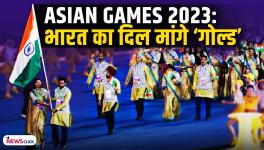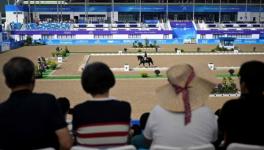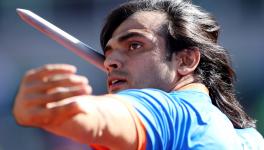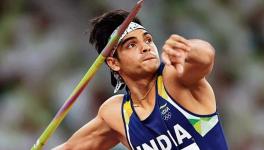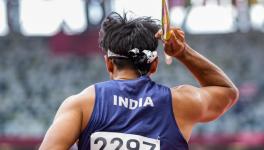MR Poovamma: Beating Team With Fastest 400m Runner in the World Makes Relay Gold Special
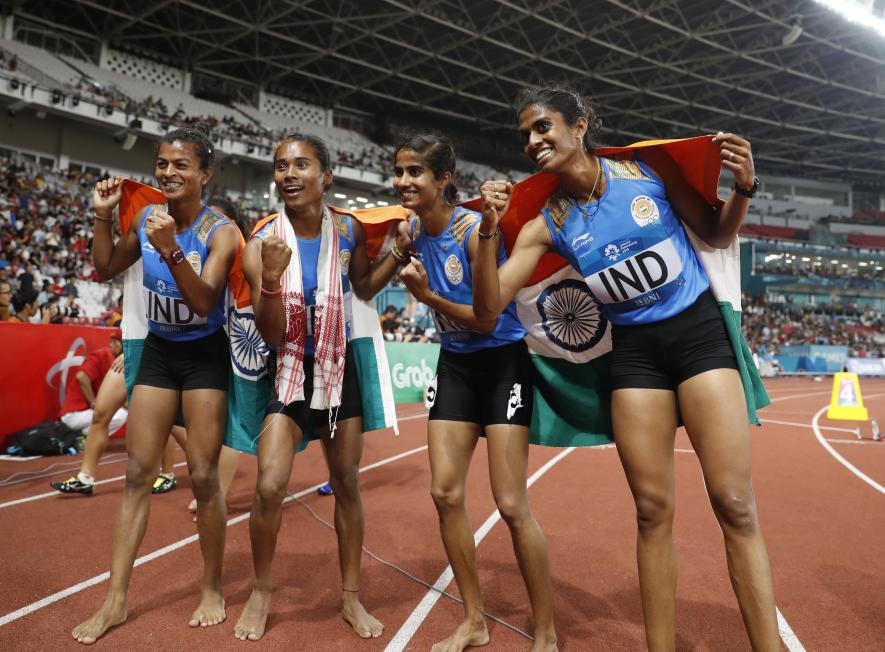
(From left) Saritaben Gayakwad, Hima Das, VK Vismaya and MR Poovamma celebrate after winning gold in the women’s 4x400m relay at the Asian Games in Jakarta on August 30 (Pic: IANS).
A gold medal is special under any circumstance, no doubt. But, when the top prize at the Asian Games — at any competition for that matter — comes after an athlete manages to upstage the best in the world, the medal attains a deeper meaning. Its significance transcends the podium, going much beyond the fervour or emotions the celebrating athletes, the fluttering flag, and the national anthem conjure up. The gold medal gets an additional gleam from a promise for the future, while dreams and aspirations of the athlete involved find new horizons.
When Hima Das, MR Poovamma, Saritaben Gayakwad and VK Vismaya climbed onto the top rung of the podium to celebrate the country’s final gold (in the women’s 4x400m relay) from athletics in Jakarta, on the last day of track and field competitions at Gelora Bung Karno (GBK) Stadium on August 30, they stood tall with a realisation that could, in the coming years, take them to higher pedestals.
India retained their monopoly over the 4x400 women’s relay at the Asian Games with the victory, a gold-medal winning tradition which started way back at the Busan Asian Games in 2002. But neither in Busan, nor the Asian Games record- breaking run in Incheon 2014 — Poovamma was part of that quartet as well — signified an achievement that went beyond continental boasting rights. This did, and Poovamma was first to point that out when Newsclick caught up with her for a chat a day after the team’s victory.
“We are very happy. You have no idea how hard I ran that race, how hard we all ran,” said the 28-year-old. “It was a race we started as underdogs but we believed we could win. That belief made us run without any inhibition, giving it our best. After the loss in the 4x400 mixed relay to Bahrain there was always pressure. Pressure was also there because India have always won this event [this was India’s fifth gold in a row at Asiad].”
Also Read | Indian Men’s Hockey Still in Bronze Age, Women on Cusp of History at Asian Games
Earlier this week, Das and Poovamma were part of the Indian 4x400 mixed team quartet which lost to Bahrain, led by 400m hurdles champion Oluwakemi Adekoya and Salwa Naser, the 400m individual gold medallist. This edition of the Asian Games, Bahrain and Qatar’s African-born naturalised athletes have pushed up the envelope of performance in athletics, taking it much closer to the world standards.
“Naser is the fastest 400m runner in the world at the moment. And the other runners in their group are fast too. To beat such a team and win gold is extra special. It has also made us realise that as a group we can compete as well as beat the best in the world. We have gained that confidence now. I believe we, as a team, can develop into a formidable one on the world stage in the coming two or three years.”
The quality and potential of this young Indian quartet is evident. Das, the junior world champion is 18 while Vismaya and Gayakwad are in their early 20s. Poovamma, the most seasoned in the mix, is 28 and has a good four to five years of top level running in her.
However, we have seen similar Indian quartets come and go in the last 20 years or so, winning gold at the Asiad but fading away soon after. The factor that make this group special is the same X factor behind the “bold” strategy that earned them gold in Jakarta — their coach Galina Bukharina.
Also Read | PV Sindhu Breaks New Ground at Asian Games
“The decision was made by coach Galina,” revealed Poovamma. “She wanted Hima to start the race and me to run the second leg and build up as big a lead as possible. This, she believed, would negate anything Naser would throw at us when she runs the anchor leg for Bahrain. We were asked to give it everything, and once I handed over the baton to Sarita, with more than a second’s lead, we knew the medal is ours. But yeah, both Sarita and Vismaya ran well to keep the Bahraini attempts at bay.”
Coach Bukharina’s strategy was beautiful in its simplicity and boldness. Conventional running wisdom is to put the best runner in the anchor leg. But the fastest Indian, Das, is slower than Naser, Bahrain’s trump card. So, the coach decided to flip the order, and with it the odds. The rest, like they say, is history!
The coach’s positive influence, however, goes much deeper than the last-minute strategy or pep talks, reveals Poovamma. Unlike what has been the norm with Indian relay teams — known for last minute selection of squads with no time or room for training or figuring out race strategies — this quartet had trained together, both at the national camp and through the one week in Jakarta. This, despite the fact that the last member of the team, Vismaya, was finalised only a week before, after a selection trial on the sidelines of the Asiad.
“That selection confirmation for Vismaya happened last week but the coach was confident she will make it and we had trained together as a team even during the camps,” said Poovamma. “The coach has made a huge difference in our personal performances too. Our training is customised according to our individual needs and abilities as an athlete. And, for the relay, we had special sessions to get things in order, so that we work together as a well-oiled machine.”
Also Read | Corruption and Mismanagement Rule Indian Sport; Kabaddi's Story at the Asian Games Tells Us Why
That well-oiled machine won with a timing of 3 minutes, 28.72 seconds, three hundredths of a second off the Asian Games record set in Incheon (3:28.68). The gold-medal winning time at the Rio Olympics though was 3:19.06. This quartet’s performance is more than 10 seconds off that timing, a deficit that is tough to bridge. But the team could shave off quite a bit of the deficit, believes Poovamma, if all the athletes in the mix develop systematically under coach Bukharina.
“That belief is there among us now,” said Poovamma. “The training is systematic with set goals — timing and performance more than medals — and with the the guidance from the coach, as well as support from the national athletics federation, we are confident of pushing things closer to the world standard, and not just the qualifying mark for the Olympics.”
India have had a very good outing in athletics at the Asian Games. But going by comparative performances — timing or distances in the case of field events — javelin ace Neeraj Chopra is the only athlete who has a realistic potential to develop into an Olympic medallist by Tokyo 2020.
While giving all due respect to the medals won by Dutee Chand, Manjit Singh, Tejinder Pal Toor, Swapna Burman, Jinson Johnson, Arokia Rajiv, Ayyasamy Dharun and Co., we do understand too that these medallists have quite a long journey to traverse, performance wise, before they can become names to be reckoned with on the world stage.
Also Read | Gold Sweat: Vinesh Phogat’s Gritty Journey to Historic Asian Games Triumph
So where does the relay team stand in that objective analysis? Quite behind, one would say, but relays do have a logic-defying streak in them as well. The team with the fastest runners doesn’t always end up winning the race.
The Indian women’s quartet showed us how in Jakarta, and who is to bet against them killing a few more giants on the track in the coming years. Especially now, backed by systematic training under a coach who has brought in fresh ideas and a new philosophy, they have started to believe in themselves after the big kill.
Get the latest reports & analysis with people's perspective on Protests, movements & deep analytical videos, discussions of the current affairs in your Telegram app. Subscribe to NewsClick's Telegram channel & get Real-Time updates on stories, as they get published on our website.









